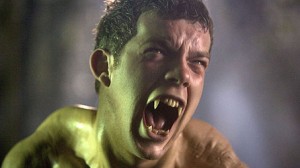Being Human Goes Off the Rails February 17, 2010 – Posted in: Aberrant Normalcy
I have been watching the British TV show, Being Human, am all caught up, and, well, I’m downright angry that they basically destroyed a fabulous show with some downright shitty writing.
[WARNING: MAJOR SPOILERS BELOW]
Consider the following: George falls in love with a woman named Nina who is a smart-aleck, funny, perky little woman who he then subsequently accidentally turns into a werewolf like him. Whoops. This devastates him completely. So then what does he do in the final two episodes of the second season? He moves in with his rebound fling. And here’s one even better: she has a daughter. After his devastation, the first thing he chooses to do is to move his curse in close proximity with not just one innocent woman, but her daughter too. This from a man who has an IQ supposedly in the 150s. Not buying it.
Also not buying the wise-beyond-her-years daughter who figures that her mum’s lovey-dubbey has a deep and possibly dangerous secret (he’s not really a tobogganist, who knew?) and she, you know, doesn’t tell her mom. Why? Because she likes him, that’s why.
Then there’s Mitchell. The sometimes evil, sometimes cuddly vampire who decides to quit blood cold turkey and go “clean.” Which might actually be kind of cool (and is) if he occasionally broke down and killed someone (which he does) and he didn’t try to turn all the dirty, nasty, blood-thirsty vampires into recovering addicts who must attend BA meetings to keep their heads about them. And, you know, what ever happened to the vampire lore that they’d die without blood? Not a problem here. It can be overcome. So basically, in Being Human, vampires are immortal humans who can’t be captured on film or in a mirror. At least Angel was a miserable vampire-in-recovery. When Mitchell smiles he looks about as threatening as Big Bird.
And Annie, the ghost. We spend several episodes watching her outwit the after-death doors and the spirits behind them, who try to forcefully take her into their dark realm. We hear subtle and cryptic references to the afterlife not being a room full of angels, but a dark hallway, whose end is attended by angry men with clubs. Kudos for a radical reinvention of the near-death experience. But that all falls away in the last episode of season two when Annie “accidentally” stumbles across a psychic who’s lost his powers to commune with the dead, but can somehow still hear her. Annie’s mother, in another absurd coincidence, visits the psychic’s show soon after. (And in a weird choice for the actress, they chose a white woman as her mother; I always assumed Annie was black). Then, through psychic Joe as their medium (ha!) they have their tender moment of sentiment, maudlin tears fall. Annie makes a napkin rose; Mom places the rose on her tombstone. How touching. Now Annie can move on. She’s ready to confront the door, which has, mind you, been turned in the final episode from a creepy, demon-infested corridor into a glowing beacon of light. When did this happen? So now, no more bogey men on the other side. It’s all warmth and light and Judeo-Christian love. Might as well just give up watching now.
Really, it was sad how a show with such great potential just jumped the tracks (or the shark, depending on your metaphor). I was actually starting to like it.


2 Comments
Chinaren February 28, 2010 - 17:37
I totally agree with just about all of your comments!
It seems to go even more off the rails with Mitchel later on, and his sudden decision to go and kill all the humans. They must have changed writing teams or something.
Matthew Kressel February 28, 2010 - 17:44
Thanks, Chinaren. I just now realized there were two more episodes to season two. I assumed there were only six, that ep 6 was a season-ending cliff hanger. So I have to watch the last two. Mind you, I’m not hoping for much.